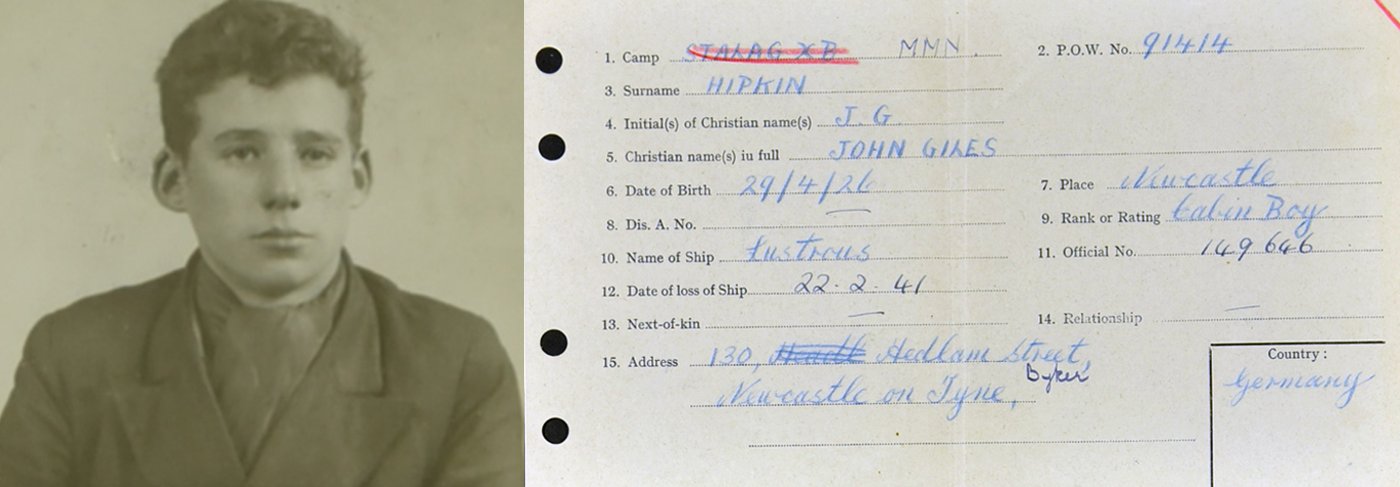Joining the Merchant Navy
John Giles Hipkin was born on 29 April 1926 in Byker, Newcastle-on-Tyne. At the age of 14, with the Second World War underway, he joined the Merchant Navy as a cabin boy. John first set to sea on the tanker SS Lustrous in January 1941.
Cabin boys, generally around John's age, were hired to assist and serve the ship's officers. John worked long hours alongside the crew as they headed to the Caribbean to pick up oil.
The National Archives holds a photograph of John, taken when he enrolled in the Merchant Navy. It's found alongside the Seaman's record for John's service. These were known as Seaman’s pouches as records relating to individual seamen were filed together in a pouch. These documents tend to include application forms (most with a photograph of the seaman), certificates, identity cards, and cessation documents.
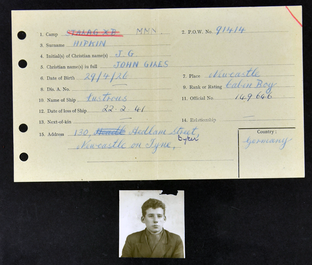
Photograph of John Giles Hipkin alongside his Seaman's record for service. Catalogue reference: BT 372/825/180
Capture
After an uneventful but stormy few weeks, on 22 February 1941, off the coast of Newfoundland, Canada, the Lustrous came under attack from German battleships. The oil tanker was hit and began to sink. The crew all manged to escape on lifeboats.
They were picked up and captured by the German forces who escorted them back to Europe on the German ship the Scharnhorst. Once on land, John was taken to a prisoner of war camp primarily for Navy personnel close to the German sea port of Bremen.
John was one of some 5,000 Merchant seamen taken into captivity by Germany during the Second World War. He spent the vast majority of his time in Stalag XB in nearby Sandbostel, a camp specifically for Merchant Navy personnel, who were treated as civilian internees.
Life in captivity
In later years, he described his time at Sandbostel as 'horrific'. The camp was split into sections by nationality. Prisoners from occupied countries suffered worse treatment. Russian prisoners were particularly badly treated, with many dying. Others became infected with tuberculosis and typhus, which spread to the rest of the camp.
At 15, John witnessed the murder of a young Yugoslavian prisoner of war by a German guard. In 1999 he told the BBC 'it's as though it happened yesterday, I can't ever forget that'.
During his four years in captivity he corresponded with his family and received Red Cross parcels though undoubtedly was affected by the psychological affects of imprisonment.
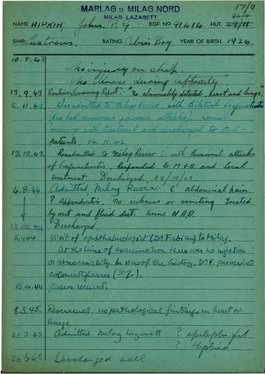
Partial transcript
4/8/44: Admitted Milag Revier. Abdominal pain ? Appendicitis. No sickness or vomiting. Treated by rest and fluid diet
21/3/45: Admitted Milag Lazarett. ? Epileptic fit ? Hysteria
4/8/44: Admitted Milag Revier. Abdominal pain ? Appendicitis. No sickness or vomiting. Treated by rest and fluid diet
21/3/45: Admitted Milag Lazarett. ? Epileptic fit ? Hysteria
John Giles Hipkin's prisoner of war card detailing time spent in the camp hospital. A number of ailments are listed including conjunctivitis, abdominal pain, and hysteria. Catalogue reference: WO 416/407/578
There is much evidence of ill treatment of British prisoners of war at Stalag XB contrary to the Geneva Convention 1929. The file WO 311/1011 details the behaviour of a German Naval Officer named Captain Prusch who joined the German staff of Stalag XB in June 1941. Shortly afterwards he was put in charge of the Merchant Navy section of the camp.
An account by Lewis Harold Lewis, Ship’s master of the SS Stanpark which was sunk in the South Atlantic in January 1941, reads:
Prusch was about six feet high, thin, red-faced, cleanshaven, grey-haired, about sixty years of age. He spoke perfect English with a German accent. He became a tyrant. There were a number of young British Merchant Navy boys, ages 16 to 18, imprisoned in the camp. They were often harshly punished by Captain Prusch for trivial offences or petty breaches of discipline. For instance, Captain Prusch used often to have a dozen of the young boys on parade and make them run up and down at signals with his whistle – run 50 yards, stop, about turn, run 50 yards, stop, and so on. This would go on for half an hour or more until the boys dropped to the ground from exhaustion.
Lewis Harold Lewis
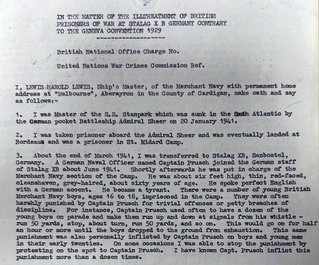
Partial transcript
- I was Master of the S.S. Stanpark which was sunk in the South Atlantic by the German pocket Battleship Admiral Sheer on 20 January 1941.
- I was taken prisoner aboard the Admiral Sheer and was eventually landed at Bordeaux and was a prisoner in St. Midard Camp.
- About the end of March 1941, I was transferred to Stalag XB, Sanbostel, Germany. A German Naval Officer named Captain Prusch joined the German staff of Stalag XB about June 1941. Shortly afterwards he was put in charge of the Merchant Navy section of the camp. He was about six feet high, thin, red-faced, cleanshaven, grey-haired, about sixty years of age. He spoke perfect English with a German accent. He became a tyrant. There were a number of young British Merchant Navy boys, ages 16 to 18, imprisoned in the camp. They were often harshly punished by Captain Prusch for trivial offences or petty breaches of discipline. For instance, Captain Prusch used often to have a dozen of the young boys on parade and make them run up and down at signals with his whistle – run 50 yards, stop, about turn, run 50 yards, stop, and so on. This would go on for half an hour or more until the boys dropped to the ground from exhaustion. This same punishment was also personally inflicted by Captain Prusch on boys and young men in their early twenties. On some occasions I was able to stop the punishment by protesting on the post to Captain Prusch. I have known Capt. Prusch inflict this punishment more than a dozen times.
- I was Master of the S.S. Stanpark which was sunk in the South Atlantic by the German pocket Battleship Admiral Sheer on 20 January 1941.
- I was taken prisoner aboard the Admiral Sheer and was eventually landed at Bordeaux and was a prisoner in St. Midard Camp.
- About the end of March 1941, I was transferred to Stalag XB, Sanbostel, Germany. A German Naval Officer named Captain Prusch joined the German staff of Stalag XB about June 1941. Shortly afterwards he was put in charge of the Merchant Navy section of the camp. He was about six feet high, thin, red-faced, cleanshaven, grey-haired, about sixty years of age. He spoke perfect English with a German accent. He became a tyrant. There were a number of young British Merchant Navy boys, ages 16 to 18, imprisoned in the camp. They were often harshly punished by Captain Prusch for trivial offences or petty breaches of discipline. For instance, Captain Prusch used often to have a dozen of the young boys on parade and make them run up and down at signals with his whistle – run 50 yards, stop, about turn, run 50 yards, stop, and so on. This would go on for half an hour or more until the boys dropped to the ground from exhaustion. This same punishment was also personally inflicted by Captain Prusch on boys and young men in their early twenties. On some occasions I was able to stop the punishment by protesting on the post to Captain Prusch. I have known Capt. Prusch inflict this punishment more than a dozen times.
Lewis Harold Lewis' account for the UN War Crimes Commission witness statements about Captain Prusch. Catalogue reference: WO 311/1011
Lewis' account does not include any names of the boys but it’s very possible that John suffered from this ill-treatment.
After the war, Prusch was charged with war crimes for mistreating prisoners of war, in contravention of the Geneva Convention 1929.
During his captivity, John's story made the news back in the UK. On one occasion on Tuesday 10 June 1941, The Hartlepool Northern Daily Mail noted:
'One of the youngest prisoners of war is John George Hipkin... He joined the Merchant Navy as a cabin boy last January, when only 14 and on his first trip the vessel was lost through enemy action. His parents have just received a letter from him stating that he celebrated his 15th birthday in a prisoners' camp'.
The Hartlepool Northern Daily Mail, Tuesday 10 June 1941
After four years as a prisoner of war, John was eventually freed on his 19th birthday on 29 April 1945, when a British tank came crashing through the barbed wire fence of his camp. He returned home on VE Day (Victory in Europe Day) on 8 May 1945.
After the war
John was discharged from the Merchant Navy on 8 July 1945 at his own request. His reason for discharge was the effects of his detention, with the word 'hysteria' entered on the form, which today might be considered a mental health condition.
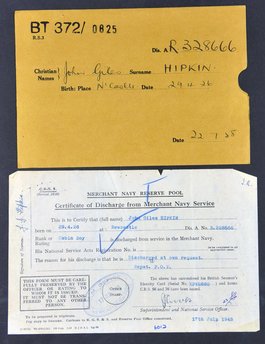
Partial transcript
Certificate of Discharge from Merchant Navy Service
This is to Certify that (full name) John Giles HIPKIN
born on 29.4.26 at Newcastle…
Rank or Rating of Cabin Boy is discharged from service in the Merchant Navy…
The reason for his discharge is that he is Discharged at own request…
17 July 1945
Certificate of Discharge from Merchant Navy Service
This is to Certify that (full name) John Giles HIPKIN
born on 29.4.26 at Newcastle…
Rank or Rating of Cabin Boy is discharged from service in the Merchant Navy…
The reason for his discharge is that he is Discharged at own request…
17 July 1945
John Giles Hipkin's certificate of discharge from the Merchant Navy. Catalogue reference: BT 372/825/180
Back in the UK, John later married and became a teacher in his hometown of Newcastle.
In 1990, John began the 'Shot at Dawn' campaign to pardon First World War soldiers executed for desertion and cowardice. Many were not given fair trials, not properly defended, and some, like him when he served, were minors. In 2006, after many years of tireless campaigning, 306 soldiers were pardoned. John was honoured by the City of Newcastle for his campaign.
John passed away in 2016, aged 90.
Records featured in this article
-
- From our collection
- BT 372/825/180
- Title
- John Giles Hipkin's Seaman's record for service
- Date
- 1913–1972
-
- From our collection
- WO 416/407/578
- Title
- John Giles Hipkin’s prisoner of war card
- Date
- 1939–1945
-
- From our collection
- WO 311/1011
- Title
- UN War Crimes Commission witness statements about ill-treatment of prisoners of war at Stalag X B, Sandbostel, Germany
- Date
- 1 May 1945 – 30 November 1947
-
- From our collection
- BT 372/825/180
- Title
- John Giles Hipkin's certificate of discharge from the Merchant Navy.
- Date
- 1913–1972
